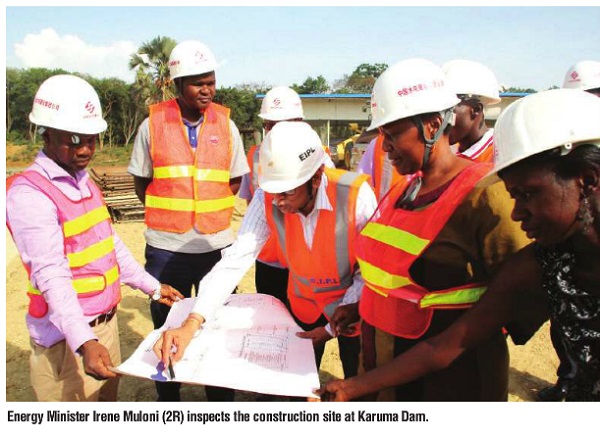
To back up his position, Kaliisa sought the legal advice of the solicitor general. In a letter datedMay 26, the Director of Legal Services, Christopher Gashirabake, while acting on behalf of the Solicitor General offered a legal opinion in which he appears determined to tread carefully.
“The policy directions (issued by Muloni onApril 15) should give UEGCL contract administration powers but with the ministry retaining the overall policy direction over the projects,” Gashirabake wrote.
He added that there is no need to terminate the contracts and agreements with the contractors and financiers.
“However, MEMD should formally appoint UEGCL as contract manager by amending the contract with the EPC contractors and Owners Engineer,” Gashirabake wrote.
He added: “UEGCL should be appointed to exercise full contract administration powers while reporting to the Ministry.”
On June 15, when this reporter called him to ask who will now be in charge of implementation of the two dams, Gashirabake denied any involvement. “I am on leave, you ask Kaliisa, I did not handle that matter,” Gashirabake said before hanging up. However, the letters secured by The Independent in which he gives his opinion, are dated May 26 and are signed by him.
Gashirabake’s cageyness is understandable. Although they are unwilling to implement President Museveni’s directive, all the government officials involved have to maintain a semblance of compliance. No one wants to be caught defying the President.
So, following Museveni’s directive, Minister Irene Muloni wrote to UEGCL in a policy directive noting that the contracts were signed by the Energy Ministry on behalf of government and that UEGCL and the transmission arm—UETCL—were only witnesses to the contract.
In effect, Muloni informed UEGCL that the Energy Ministry would remain the overall implementer of the power dam contracts with UEGCL playing a somewhat peripheral role.
Not satisfied with the minister’s directives, Stephen Isabalija, the UEGCL board chairman, on April 21, nineteen days after Museveni’s directive, wrote to Minister Irene Muloni, asking why she had not addressed the president’s directive.
Isabalija copied the letter to the Vice President, Prime Minister, the Inspector General of Police, the Permanent Secretary Minister of Finance and the Attorney General.
To keep the pressure on, the following day, on April 22, UEGCL Executive Officer, Harrison Mutikanga, also wrote to Muhakanizi requesting for financing to enable the company prepare the takeover of the contract management of the projects. That is when Muhakanizi wrote to Kaliisa.
Kaliisa and Muhakanizi are the most senior technocrats in the ministries of Energy and Finance respectively and the linchpins of President Museveni’s ambitious electricity generation projects.
Kaliisa has clocked over 40 years at the Energy Ministry and his contract was renewed at the end of 2015. The approval upset Kaliisa’s critics who claim that he turned the Ministry into a morass of poorly implemented high cost project entity.
Muhakanizi has also spent decades at Finance where he became a supremo two years ago with a pledge to fight corruption and improve efficiency in utilisation of public resources.
Kaliisa and Muhakanizi have worked together for decades and understand each other quite well. On the other hand, the UEGCL board chairman; Isabalija, and CEO Harrison Mutikanga are new kids on the block. The old-guard, however, cannot dismiss Isabalija’s team because it has had the President’s ear from the time it exposed loopholes in the Karuma and Isimba projects.
Audits ordered, ignored
The UEGCL bosses have had several meetings with the President at which they appear to have convinced him that they could supervise and implement the projects better. They hired experts who exposed alleged poor workmanship at the dams and other excesses by the contractors that potentially threaten the projects. Among alleged anomalies exposed by the audit is one that the contractors are allegedly cutting corners in a bid to enrich themselves.
Some of the extra costs are directly as a result of the fight between government implementing agencies and could have been avoided. Others were not planned for according to the high level independent audit by Dr Kamal Gautam of ILF Consulting Engineers. Completed on June 12, 2015, the audit warns that some of the lapses stand to impair the project if not avoided.
When he received the audit on June 22, 2015, Muhakanizi wrote to Kaliisa notifying him about concerns in the audit.
Among these was ineffective leadership in the implementing process of the projects, lack of competent and experienced personnel working with the project supervising firm on the dam; Energy Infratech, and that the contractor was working without approved drawings and work methodology.
 The Independent Uganda: You get the Truth we Pay the Price
The Independent Uganda: You get the Truth we Pay the Price


